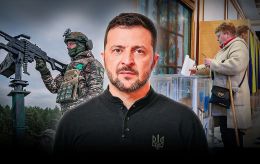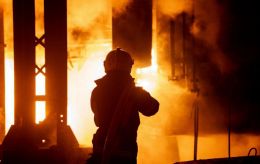Turning the wrong way: What lies behind Azerbaijan's policy toward Russia and Ukraine
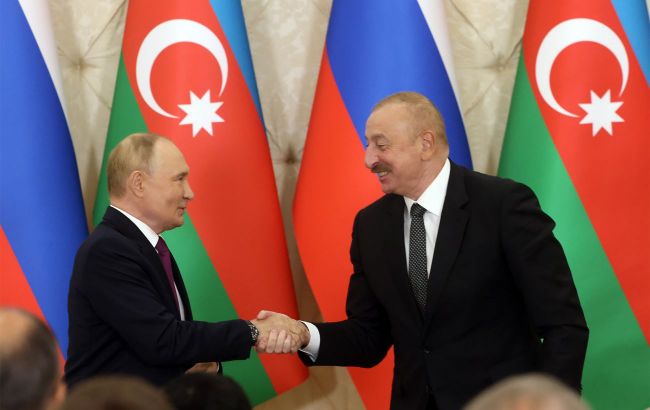 Ilham Aliyev and Vladimir Putin (photo: Getty Images)
Ilham Aliyev and Vladimir Putin (photo: Getty Images)
Azerbaijan has recently been increasingly flirting with Russia. More about whether this reflects a new trend or an extension of an existing strategy, and what it means for Ukraine, in the article by RBC-Ukraine.
Contents
- Azerbaijan, Russia, and Ukraine - Specific facts
- How the Nagorno-Karabakh factor influences Azerbaijan's policy
- The Belarusian scenario in the South Caucasus
Azerbaijan has recently been making more diplomatic "curtsies" towards Russia. One of the most notable ones happened on August 18, when during Putin's visit to the country, the leadership of Azerbaijan helped the Russian dictator once again circumvent international isolation. But that’s not all.
Azerbaijan, Russia, and Ukraine - Specific facts
In addition to bolstering Putin's public image, the Azerbaijani company SOCAR is negotiating with Gazprom to supply gas through Russia and Ukraine to Slovakia and Hungary.
The "South-North" logistics corridor, which will link Russia and its de facto ally Iran through the territory of Azerbaijan, is also being actively developed. This involves the construction of railways and highways. There are also plans to build tankers jointly.
The day after Putin's visit, Azerbaijan applied to join BRICS. This organization had long existed in the format of China, Russia, India, Brazil, and South Africa. However, it has recently been expanding by including other states that have complicated relations with the West.
Azerbaijan has always played a multi-vector foreign policy. However, its current position is determined by several factors.
On the other hand, in relations with Ukraine, Azerbaijan has shown much less activity.
Since Russia's full-scale invasion, Azerbaijan has provided only humanitarian aid to Ukraine, has not joined any sanctions packages, has not voted for UN resolutions condemning Russia's aggression against Ukraine, and ultimately did not participate in the peace summit, while many other countries sent at least ambassadors.
The assessments of experts interviewed by RBC-Ukraine vary in their level of radicalism.
"Azerbaijan has become Russia's 'outpost in the South Caucasus,'" says Azerbaijani author, historian, and human rights activist, head of the Department of Conflict and Migration of the Institute for Peace and Democracy (Netherlands), Arif Yunusov.
According to Georgian political scientist Gela Vasadze, Azerbaijan's policy is still relatively neutral.
"Baku, in this regard, to some extent repeats Turkey's path but does not copy it. Because Turkey can build a Bayraktar plant in Ukraine while simultaneously buying Russian gas and profiting from Russia. Azerbaijan does not have the public opportunities to do this. Therefore, unlike Turkey, they do it non-publicly," says Georgian political scientist Gela Vasadze.
The issue is only in balance. At least in the public sphere, Azerbaijan plays more on the Russian side. There are several reasons for this.
How the Nagorno-Karabakh factor influences Azerbaijan's policy
One of the key factors that explain why Russia is important to Azerbaijan is the final settlement of the situation around Nagorno-Karabakh.
Recall that this is an area between two countries where the majority were ethnic Armenians. However, it is separated from Armenia by impassable mountains, so during Soviet times, it was included in Azerbaijan, which made the connection more convenient. With the collapse of the USSR, Azerbaijan and Armenia began a war over Nagorno-Karabakh, in which the latter won. Importantly, Armenia then captured seven more districts of Azerbaijan.
De facto, Azerbaijan has completely regained control of the lost territories in two rounds – in 2020 and 2023.
According to Arif Yunusov, Moscow played an important role in this process. To punish Prime Minister Nikol Pashinyan, who is trying to break away from Russia and move closer to the West. Another goal of Russia is to maintain its influence in the South Caucasus, as the region is increasingly being strengthened by Turkey, China, and other "centers of power."
"This was Lavrov's plan, the essence of which is that Russia allows Azerbaijan to regain the seven districts around the former Nagorno-Karabakh. Azerbaijan allows Russian troops to return to its territory as peacekeeping forces," says Arif Yunusov.
A peace and political settlement agreement with Armenia has not yet been signed, and this is extremely important for Azerbaijan because it will finally allow Nagorno-Karabakh to be removed from the gray zone on the world map, attract investments for reconstruction, and normalize relations with Armenia. Regarding the latter point, there is generally political will. Diplomats from both sides agree that a peace treaty can realistically be concluded by the end of 2024.
The issue is in the details. They were concerned about the demarcation of the border between the two countries, not only in Karabakh, as the Soviet-era border was very conditional. Another aspect is transportation, which is concerned with the Zangezur corridor. This section in southern Armenia connects Azerbaijan with its isolated territory of Nakhchivan and Turkey. The corridor is strategically significant as it is part of a larger route.
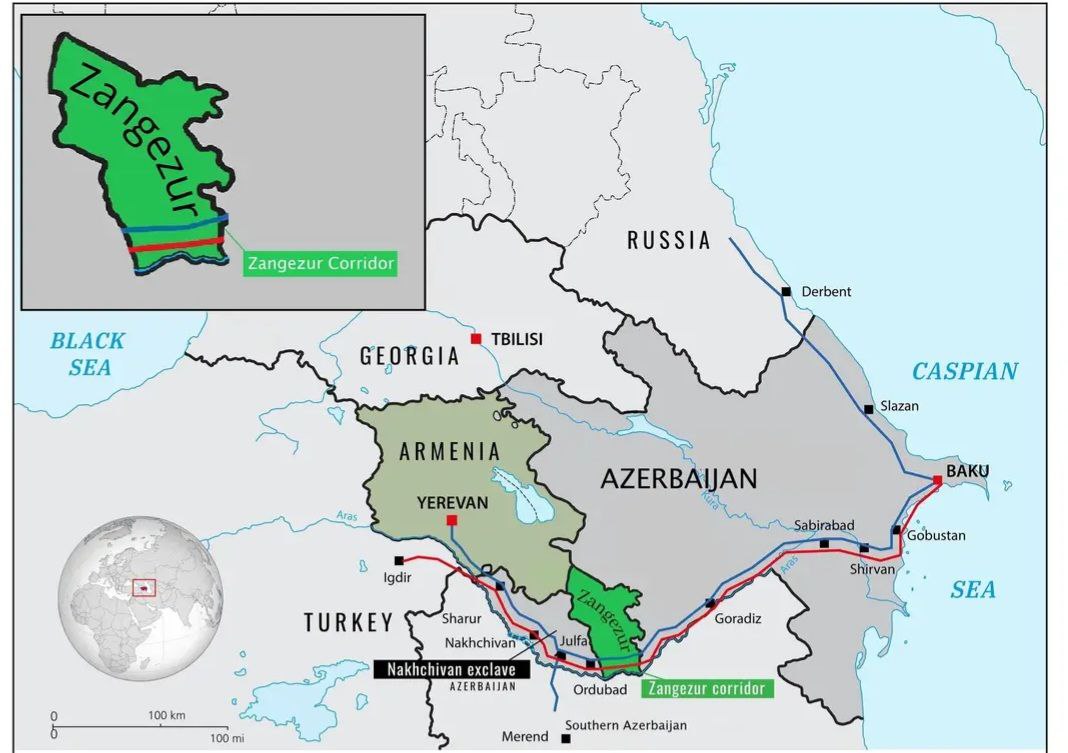
The Zangezur area is marked in green. The red and blue lines are transport routes through the Zangezur corridor (map: Tabriz Azerbaijan).
"Both Russia and Azerbaijan want Armenia to agree to open the Zangezur transport corridor. The only problem is that Armenia says it can do this without any issues, but it will control it. Azerbaijan wants the corridor to be extraterritorial so that Armenian border guards cannot control it. And Russia, of course, also wants FSB border guards to control this territory," says a South Caucasus analyst at the Polish Institute of International Affairs, Wojciech Wojtasiewicz.
This is important because whoever controls the corridor can conduct customs inspections, collect transit fees on goods passing through the corridor, or block the route under various pretexts.
Azerbaijan seeks bilateral agreements with minimal intermediary interference. And this is where there is room for talks with Russia.
"Baku needs one thing from Moscow, but it is very important: for Moscow not to interfere in resolving the conflict with Armenia according to Azerbaijan's scenario," adds Gela Vasadze.
Armenia, as the weaker side, is interested in external guarantees. Amid cooling relations with Moscow, Pashinyan's team has not been very successful in securing them by increasing cooperation with Western partners. For example, regarding the Zangezur corridor, the US and the European Union advocate for international control over it.
Armenia uses various tools, from gradually getting closer to the European Union to utilizing the capabilities of the Armenian diaspora, particularly strong in France.
France has indeed become more active in the South Caucasus, selling weapons to Armenia and providing diplomatic support.
Azerbaijan, in turn, sharply reduced the level of relations with France. Interestingly, in July, a congress of political forces and movements from France's overseas territories advocating for independence was held in Baku. During the congress, a "movement for the liberation of colonies" was established.
Returning to Russia, Azerbaijan can encourage Putin with concessions and use leverage. First and foremost, in the transport sector.
"Moscow needs a serious logistical connection with the Middle East and access to the Persian Gulf, effectively providing access to the world ocean. The port of Novorossiysk is becoming a highly questionable logistics point because the Armed Forces of Ukraine can already strike it, which increases insurance costs and everything else. And the situation there will only worsen over time," says Gela Vasadze.
Belarusian scenario in the South Caucasus
In the long term, according to Arif Yunusov, maintaining contacts with Russia is connected to Ilham Aliyev's attempts to retain political power in Azerbaijan, similar to what happened with Belarus and Lukashenko. Ultimately, both Aliyev and Putin are authoritarian leaders who are psychologically close to each other. Moreover, unlike Western countries, Putin does not speak about the need for democratic reforms in Azerbaijan.
"The euphoria over Karabakh has passed; it's now 2024, and many issues related to the socio-economic situation are on the agenda. And we have terrible corruption and monopolies," says Arif Yunusov.
At the same time, Wojciech Wojtasiewicz assesses Aliyev's current position within the country as quite strong.
"When we look at Aliyev's domestic policy, we see that he is so strong that he is now arresting almost all his opponents. There is almost no official opposition in Azerbaijan, but even journalists, scholars, activists, and others are being arrested. Almost every month in the past year, there have been new waves of arrests," says Wojciech Wojtasiewicz.
In the parliamentary elections on September 1, the presidential party "New Azerbaijan" won 68 out of 125 seats. Another 44 seats went to independents who adhere to the pro-government stance. And in February this year, Ilham Aliyev was re-elected president for the fifth time, with 93.3% of the vote.
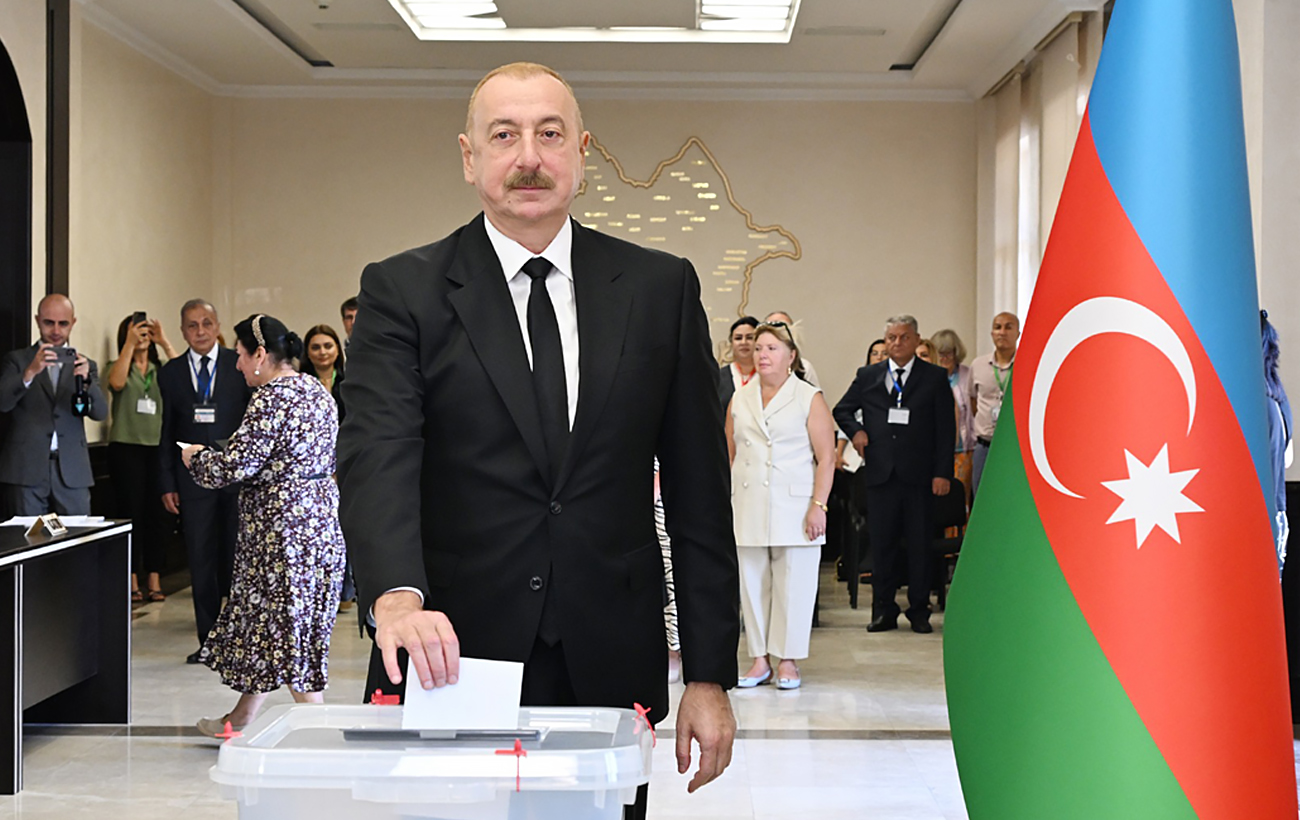
Azerbaijani President Ilham Aliyev votes in the September 1 parliamentary elections (photo: president.az)
This does not rule out various "black swans." As practice shows, in countries like Azerbaijan, a revolutionary situation arises mainly not because of economic difficulties. It occurs when, after economic growth, a middle class emerges that cannot fully realize its political and economic freedoms, as all power belongs to the old political elite.
Western countries regularly criticize Azerbaijan for human rights violations and the state of democracy. In January of this year, the Parliamentary Assembly of the Council of Europe decided not to approve the credentials of the Azerbaijani delegation. This formal step became a political signal of European dissatisfaction with Baku's actions, especially in the Karabakh territories. In response, Baku announced that it was leaving the assembly.
Occasionally, ideas emerge in the US and the European Union to impose sanctions on individual Azerbaijani politicians and officials. For example, a corresponding bill was registered in the US Congress in April of this year. It proposes sanctions against more than 40 individuals allegedly involved in human rights violations. However, the bill has served more as a tool of political pressure.
At least for now, for European Union countries, the ability to receive gas from Azerbaijan outweighs concerns about human rights.
"Aliyev does not like France's position, which supports Armenia. But on the other hand, he knows very well that now, when the European Union has imposed sanctions on Russia and decided not to import oil and gas from the Russian Federation, they simply need other sources. One of these sources is Azerbaijan when we talk about oil and gas," notes Wojciech Wojtasiewicz.
Azerbaijan's current position at least raises the question of whether it is a "strategic" partner for Ukraine. In reality, "before the full-scale invasion," there were indeed many common points of contact, from the supply of Azerbaijani oil to Ukraine instead of Russian to political support for Azerbaijan's actions in Nagorno-Karabakh. Today, these common interests are gradually disappearing.
The only thing that currently holds Ukraine back from taking a strong stance against Azerbaijan is the desire to prevent another country from moving from the group of partners to the group of open enemies. At the same time, Kyiv has ways of influencing Baku. At the very least, these involve blocking the implementation of a new gas transit project to Slovakia and Hungary if Azerbaijan continues to play along with Russia.
Sources: comments from Georgian political scientist Gela Vasadze, Head of the Department of Conflict and Migration at the Institute of Peace and Democracy (Netherlands) Arif Yunusov, and South Caucasus analyst at the Polish Institute of International Affairs Wojciech Wojtasiewicz.
